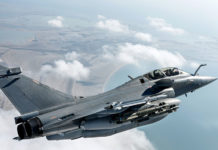By Ray Peterson, Forecast International
Although Brazilian President Luiz Inacio Lula da Silva has no doubt been stirred by Venezuela’s military buildup, he also recognizes the need for his own country to rectify its deficient level of armaments in order to strengthen Brazil’s position as a regional leader. He has increased pressure to make funds available for two ambitious military programs, previously sidelined due to funding problems, in order to fulfill some of the armed forces’ pressing equipment needs. In addition, a new strategic plan is being drafted that will garner long-term economic and military benefits for the entire nation.
Between 2006 and 2007, the two largest programs for the armed forces were pushed to the back burner and essentially dropped altogether because of funding problems. After years of consecutive budget shortfalls, the ambitious nuclear submarine and fighter jet plans for the Navy and Air Force, respectively, were scuttled. However, the government, finally recognizing the urgent need for these requirements, has allocated funding for each program.
One such program, the Air Force’s fighter requirement, was resurrected in November 2007, with the selection process initiated in January 2008. An initial budget of $2.2 billion has been designated for procurements. New plans have been drafted for the requirement, and the program has been renamed project FX-2. The new plan calls for the entire fighter fleet to be replaced, with the first batch of 36 fighter aircraft to be procured by 2013.
In addition, the Navy’s nuclear submarine plans have been dusted off in recognition of Brazil’s need to protect its naval interests. The long-term priority of the Navy has been the development of a nuclear propulsion program. The discovery of large oil reserves in Brazilian waters has focused attention on Brazil ’s need to protect its offshore oil platforms. Finally, in February of this year, the government announced that Argentinaand Brazil will jointly develop the nuclear reactor for the submersible program; France will provide the basic design of the submarine. The design and construction of the hull alone will take between 12 and 14 years, with the overall program not yielding tangible results until sometime between 2020 and 2024. In a show of commitment, $82 million has been designated for the program in the 2008 budget.
Still, despite these ambitious programs, all three branches of the armed forces are saddled with aging equipment. The government has asked each branch to draft revised procurement plans based on necessity. Also being drafted is a new “Strategic Plan for National Defense,” which will be presented on September 7, 2008 .
“Plans are expected to shift defense priorities away from the southern borders to the Amazon region in the north, the Atlantic coast, and air space,” said Rebecca Barrett, Forecast International analyst and author of the study. “Plans will also involve the armed forces and the domestic defense industry in long-term technological and economic growth. Furthermore, plans are to focus on a rapid deployment model, with modular regional brigades that could quickly reach an area of contention at any given moment.”
Also expected to be outlined in the new strategic plan is the government’s interest in including technology transfer along with future procurements, which will have long-term economic benefits for the military, as well as industry. In this regard, the Brazilian government views this spate of modernizations as being highly beneficial on two fronts: the military itself will benefit from new equipment, and the national economy will be bolstered by a more advanced industrial capacity.
Ray Peterson is Vice President, Research & Editorial Services at Forecast International, a leading provider of Market Intelligence and Analysis in the areas of aerospace, defense, power systems and military electronics.
















